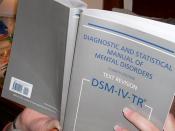University Of PhoenixClinical psychologists diagnose study and treat patients with a wide range of psychological problems and abnormal behaviors. Assessing what behavior is normal is not as easy as it might at first seem. Many challenges hinder the creation of a clear cut set of definitions for what constitutes normal and abnormal behaviors. Culture, age and religion are just a few of the factors that can reframe the context of behavior, and that will be covered in this paper. Every situation in which behavior is observed also creates a unique set of circumstances that must be considered in behavior classification. The meaning and normalcy of behaviors take on completely different shades and shadows when viewed with an understanding of this greater range of contributing dynamics.
CultureCulture can be defined in many different ways. For many, culture can refer to an appreciation of a good book, art, music or food. Others may define culture as how people feel about their traditional ways.
Culture in the psychological world refers to a range of learned behaviors according to the person's social and ethnic beliefs. "Culture is a powerful human tool for survival, but it is a fragile phenomenon" (O'Neil, 2006, p. 1). Culture can be adjusted due to new ways of living and beliefs.
Different aspects make up the word culture. First the obvious including language, traditions and beliefs set by family members for themselves. "In most cases, those who share your culture do so because they acquired it as they were raised by parents and family members who have it" (O'Neil, p. 1). The second aspect that makes up culture is how one identifies oneself within the culture. For example, people may be classified as being part of the Hispanic culture but may come from different parts of the world. While the...


